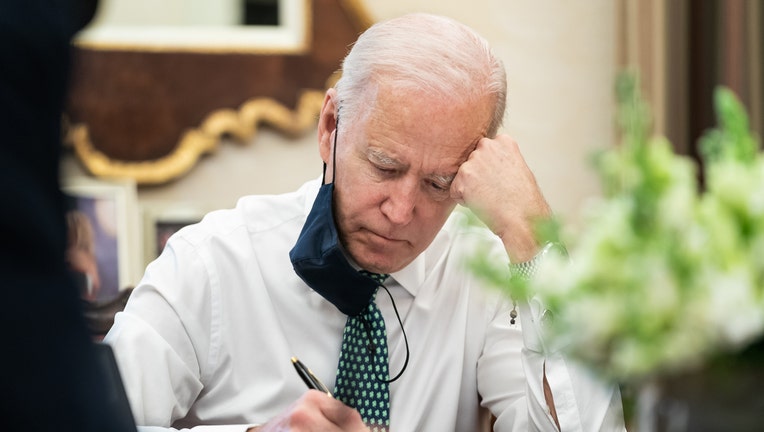Biden's $1T infrastructure bill faces key vote in Saturday Senate session

The Senate Saturday presses forward with a rare weekend session in an attempt to advance a roughly $1 trillion bipartisan infrastructure bill that's the first step to President Biden's spending agenda.
The legislation faces a key test midday Saturday that will require 60 votes to break a filibuster, with the help of at least 10 GOP senators. If successful, final passage on the major investment in rebuilding the country's roads, bridges and water systems could come as early as this weekend.
President Biden and the authors of the legislation say the bill is long overdue to repair the nation's crumbling infrastructure and prove that Congress can still work together in a bipartisan way for the good of the country.
"It’s a bill that would end years of gridlock in Washington, and create millions of good-paying jobs, and put America on a new path to win the race for the economy in the 21st century," Biden said Friday.
The Infrastructure Investment and Jobs Act would funnel about $550 billion in new spending on roads, rail, public transit, bridges, broadband access, waterways and more. The legislation also repurposes unused COVID-19 funds for infrastructure projects.
The bipartisan coalition of Republicans and Democrats had been working on striking a deal for months with various setbacks along the way. One hurdle came Thursday when the Congressional Budget Office (CBO) determined the legislation wouldn't be fully paid for – as authors had originally said – and instead would add $256 billion to the deficit over the next 10 years.
However, the lead negotiators of the bill – Sens. Rob Portman, R-Ohio, and Kyrsten Sinema, D-Ariz., – said Thursday the CBO score didn't take into account all the pay-fors for the proposal and revenue from projected future economic growth.
"The American people strongly support this bipartisan legislation and we look forward to working with our colleagues on both sides of the aisle and President Biden to get it passed through Congress and signed into law," the two senators said Thursday in a statement.
The news that the legislation would add to the deficit cemented certain GOP senators' opposition to the bill. Meanwhile, former President Donald Trump has been trying to whip up opposition to the bill from the sidelines. In a statement Saturday, Trump said the legislation would be "a gift to the Democrat Party, compliments of Mitch McConnell and some RINOs, who have no idea what they are doing."
So far, 17 Republican lawmakers joined with Senate Democrats last month to advance the infrastructure bill. Senate Majority Leader Mitch McConnell, R-Ky., was among the Republicans who voted in favor. Saturday's vote will be another test to determine the strength of the bipartisan coalition.
If the bipartisan bill is successful, Senate Majority Leader Chuck Schumer intends to move quickly to a separate $3.5 trillion sweeping budget blueprint to make major investments in so-called human infrastructure. Biden and House Speaker Nancy Pelosi have said both the bipartisan bill and the broader budget reconciliation legislation should be passed together.
Republicans oppose the $3.5 trillion plan that would expand Medicare access, child care support, education spending and more. Democrats intend to use a special budget process to pass that plan by a simple majority vote, which won't require Republicans.
Sen. Bill Hagerty, R-Tenn., on Thursday objected to a speedier timeframe to pass the bipartisan bill, in part, because he said it would pave the way for Schumer, D-N.Y., to ram through the $3.5 trillion "totally partisan tax and spending spree."
"He’s trying to shove us in that direction," Hagerty told "FOX Business Tonight."
"I’m not going to do anything to expedite his movement toward the ‘transformation’ of America that Joe Biden has talked about."

